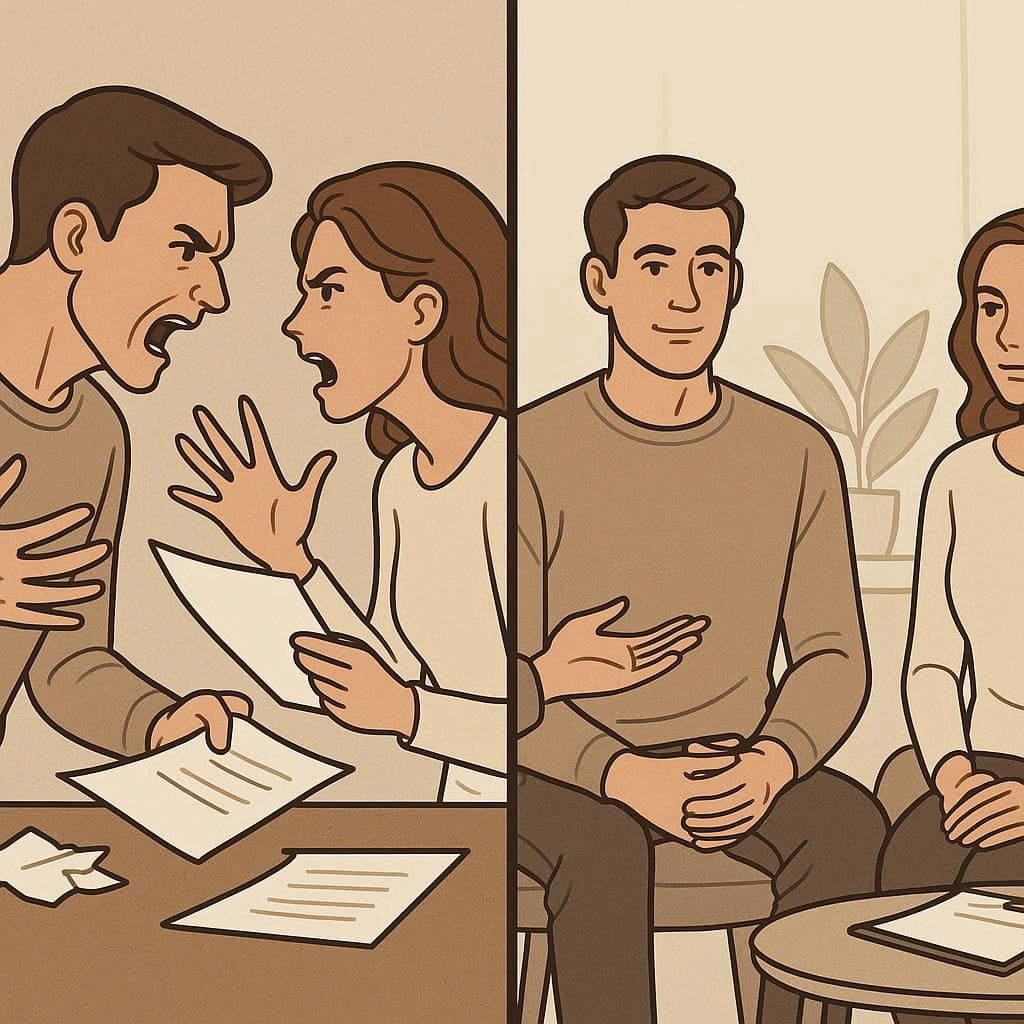Divorce Mediation – A Friendly Guide
A Friendly Guide to Peaceful Separation
A Better Approach to Divorce
When facing divorce, the traditional approach often involves lawyers, court battles, and unnecessary conflict. This process can be emotionally draining and financially devastating for everyone involved.
Divorce mediation offers a different path—one focused on collaboration, respect, and finding solutions that work for both parties and any children involved.
How Mediation Works
In mediation, a neutral third party helps you and your spouse communicate effectively and work through the practical aspects of your separation. Rather than having decisions imposed by a judge, you maintain control over the outcomes regarding:
- Parenting arrangements and custody
- Division of assets and property
- Financial support matters
- Any other issues unique to your situation
Benefits of Choosing Mediation
Reduced Conflict
Mediation focuses on cooperation rather than confrontation. By working together to find solutions, you can minimize the emotional damage that often comes with divorce.
Cost Effectiveness
Mediation typically costs significantly less than traditional litigation. You’re investing in one professional rather than two opposing attorneys.
Faster Resolution
Without waiting for court dates and legal procedures, mediation often resolves issues more quickly than the traditional court system.
Customized Solutions
Unlike court-imposed decisions, mediation allows you to create agreements that specifically address your family’s unique needs and circumstances.
Is Mediation Right for You?
Mediation works best when both parties are willing to communicate openly and work toward fair solutions. While it may not be appropriate in cases involving domestic violence or extreme power imbalances, it offers an excellent alternative for most separating couples.
Even if you and your spouse have difficulty communicating, a skilled mediator can facilitate productive discussions and help you find common ground.

Divorce Mediation
What Is It?
I’ve revised the content to reduce keyword repetition while maintaining SEO value. Changes include using natural variations like “mediation process,” “working with a mediator,” and “guided negotiation.”
Collaborative Process
Both parties work together with a neutral mediator to reach mutually beneficial agreements
Cost-Effective
Significantly less expensive than traditional court litigation and legal battles
Fair Resolution
Ensures both sides are heard and their concerns are taken into account
Emotional Wellbeing
Reduces emotional stress and trauma compared to adversarial court proceedings
Key Areas Covered in Mediation
- ✓ Property division and asset distribution
- ✓ Financial concerns and support arrangements
- ✓ Child custody and parenting plans
- ✓ Communication and conflict resolution
Considering using a mediator for your divorce or exploring other alternatives for an amicable separation? This approach guarantees that both parties are heard and their concerns addressed. Working with a divorce mediator is particularly valuable if you want to avoid the significant emotional and financial toll of court battles.
Complete Divorce Mediation Guide
What are the Mediation’s Five Steps?
First Meeting
The mediator makes sure both of you are okay to go ahead and clarifies the procedure.
Finding Problems
Together you list important subjects including money, property, and parenting.
Finding Solutions
The mediator will help you to come up with reasonable answers.
Reaching Resolutions
Conversations result in choices that fit you both.
Drafting the Agreement
Ready for legal review, the mediator creates a paper outlining all of your agreed upon points.
What Does a Divorce Mediator Do?
A divorce mediator is someone who is trained to help couples make hard decisions without favoring either side. They lead conversations, clarify legal concerns, and enable you to arrive at mutually advantageous answers.
What is the Primary Goal of Mediation?
Mediation seeks to provide a setting where you and your partner may engage in meaningful chats. It’s about saving time and money, cutting down on disagreements, and enabling you to have some say in the result.
Why Should One Select Divorce Mediation?
Mediation has several benefits over conventional divorce:
💰 Cost-Effective
Divorce mediators are far less expensive than employing attorneys for a drawn-out court battle.
⚡ Faster Results
Mediation typically finishes in weeks or months as opposed to years in court.
😌 Far Less Stress
Sitting down to discuss things over is far less emotionally exhausting than fighting in court.
🎯 Control Over Outcome
With the help of the mediator, you choose what suits your family best.
🔒 Privacy
Unlike court cases, everything talked about in mediation is kept secret.
How to Select the Appropriate Mediator
If you are looking for “family law mediators near me” or “divorce arbitration near me,” here are some tips to assist you in finding the best fit:
- Search locally using phrases like “divorce mediator near me” or “separation mediator near me”.
- Seek for Experience: Pick a candidate with knowledge in couples mediation and marriage mediation.
- Look for someone within your budget by requesting a divorce mediator cost breakdown.
Aneel Irshad Khan
Advocate High Court
For expert support, get in touch with Aneel Irshad Khan, Advocate High Court, who provides expert, written advice for your mediation needs.
Mediation vs. Arbitration
Uncertain whether mediation is perfect for you? Here is how it differs from arbitration:
Mediation
A mediator helps you and your spouse to decide jointly.
Arbitration
An arbitrator listens to both sides and makes legally binding rulings on your behalf.
Though they both seek to avoid court, mediation lets you have more influence over the ultimate result.

When Should You Consider Divorce Mediation?
Mediation works best if:
- You and your partner are willing to communicate and compromise.
- You want to avoid the stress and cost of court.
- You need help navigating tricky issues like parenting conflicts, property division, or financial disagreements.
Why Mediation Makes Sense
Divorce mediation isn’t just about splitting assets or resolving custody—it’s about finding a path forward. Whether you’re facing challenges with different priorities, money issues, or parenting conflicts, mediation helps you focus on solutions instead of problems.
Divorce can be a tough journey, but divorce mediation offers a way to move forward with respect and understanding. Instead of turning to costly and stressful court battles, mediation helps couples work together to find solutions that benefit everyone—especially when children and shared futures are involved.
Choosing divorce mediation means choosing open communication, fairness, and control over your decisions. Whether it’s resolving parenting conflicts, dividing assets, or creating a new path forward, mediation keeps the focus on collaboration, not confrontation.
Finding Your Path Forward Through Mediation
Divorce mediation helps determine the course ahead during one of life’s most challenging transitions. Divorce is never easy, but your response to it will make all the difference—for you, your ex-partner, and most especially your children.
Though the standard court case might seem like the default approach, mediation provides a compassionate alternative that stresses cooperation over conflict, understanding over blame, and solutions above challenges.
Choosing mediation means you choose to maintain control over your future. Even if your romantic relationship has ended, you’re acknowledging that your shared humanity doesn’t have to end with it. Through respectful dialogue and mutually beneficial solutions, mediation honors the history you once built together.
Mediation helps you develop a new framework for your separate lives that preserves dignity and lessens the emotional weight on everyone involved, especially children.
Whether you’re dealing with complex financial decisions, parenting arrangements, or property division disputes, mediation provides a structured yet flexible approach to handle these issues with the help of a neutral mediator. It empowers you to create customized solutions tailored to your unique circumstances—solutions no court could mandate.
As you consider your options, remember that your divorce-related decisions will influence not just your future but the lives of your loved ones. Mediation provides a path not just to legal dissolution but to genuine resolution and, ultimately, to healing.

Share Your Thoughts
Have questions about working with a stock attorney or dealing with securities law issues? Drop your thoughts or experiences in the comments — we’re here to help and learn together.
Read More
Explore our other blogs on legal, tax, and financial topics to stay informed and protected in today’s fast-moving markets.
Visit Our Blog Section


Thank you for this insightful article on divorce mediation. I really appreciate how you highlighted the benefits of mediation in reducing conflict and allowing both parties to have a voice in the process. It’s reassuring to know that mediation can be a more amicable and cost-effective alternative to traditional litigation. I believe this approach not only helps resolve legal matters but also encourages healthier communication during a difficult time. Looking forward to reading more of your content.
Thank you for your time and studying blog critically!
Of his works, he is especially famous
Thank you
among them acquired “Moral
Thank you for sharing your thoughts! Could you please elaborate on what you mean by ‘among them acquired “Moral”’? I’d love to understand your perspective better and engage in a meaningful discussion.”
Cool + for the post
Thank you so much for your time and interest!
European glory, and even after
Thank you for your comment! Divorce mediation can be a valuable tool in helping couples reach amicable agreements, allowing for a less stressful and more cooperative process. It can often be a more cost-effective and faster alternative to traditional divorce proceedings. If you have any specific questions about divorce mediation or how it works, feel free to ask! I’d be happy to provide more insight or clarify any details.
interesting post
Thank you so much for your interest and time for reading!
interesting for a very long time
Thank you for your time and interest!
Awesome news for all us
Thank you!
Hello. And Bye.
Thank you for your comment and for taking the time to engage with this topic.
Divorce mediation can indeed be a powerful tool for resolving conflicts amicably while prioritizing the needs of both parties and, if applicable, their children. It’s a flexible, cost-effective, and less adversarial approach compared to traditional litigation.
If you have specific questions about how mediation works, its legal implications, or how it might apply to your situation, feel free to ask. I’d be happy to provide more details or clarify any aspect of the process to help you make informed decisions.
Your input enriches the discussion, so thank you once again!
Thanks for the article.
You’re very welcome! I’m glad you found it helpful. If you have any questions or would like more details on any part of the topic, feel free to ask — I’m here to help.
Thanks for the article.
You’re very welcome! I’m glad you found it helpful. If you have any questions or would like more details on any part of the topic, feel free to ask — I’m here to help.
Thanks for the article.
Welcome!
Thanks for the article.
Welcome!
Thanks for the article.
You’re welcome! I’m glad you found it helpful. Feel free to reach out if you have any questions or need more information.
Thanks for the article.
Welcome!
Thanks for the article.
You are Welcome!
Thanks for the article.
Welcome!
Thanks for the article.
Welcome!
Thanks for the article.
Welcome
Thanks for the article.
Welcome
Thanks for the article.
You are Welcome!
Thanks for the article.
Welcome
Thanks for the article.
You are Welcome!
Hello all!
I’m glad to join this community.
I’m currently learning Hindi and enjoy exploring new languages.
Happy to connect with other language learners here!
Hi,
Thank you for reading!
Thanks for the article.
Welcome!
Thanks for the article.
Welcome
Thanks for the article.
Welcome!
Thanks for the article.
Welcome
Welcome
Thanks for the article.
Welcome
Thanks for the article.
You are welcome
Thanks for the article.
Welcome! Thanks for reading!
Thanks for the article.
Welcome!
Thanks for the article.
Welcome
Thanks for the article.
You are welcome!
Thanks for the article.
Pleasure!
Thanks for the article
Pleasure
Thanks for the article.
My pleasure!
Thanks for the article!
Pleasure
Thanks for the article
Welcome!
Thanks for the article
You are welcome!
Thanks for the article
Pleasure!
Thanks for the article
Pleasure
Thanks for the article
Welcome
Thanks for the article
So nice of you!
Thanks for the article
Welcome
Thanks for the article
Pleasure!
Thanks for the article
Pleasure
Thanks for the article
You are welcome
Thanks for the article
Pleasure is all mine!
Thanks for the article
My pleasure
Thanks for the article
You are welcome!
Thanks you…
Welcome
Thanks for the article
Welcome
Thanks for the article
My pleasure!
Thanks for the article
So nice of you!
Thanks for the article!
Pleasure
Your blog consistently offers a exceptional blend of perspective and innovation, making it a must-read. It would be intriguing to see you examine how these ideas intersect with modern developments, such as artificial intelligence or sustainable practices. Your knack for simplifying intricate concepts is remarkable. Thanks for always sharing such enlightening content. I’m excited for what’s next!
Thank you so much for your thoughtful feedback! 🌟 I truly appreciate your encouragement and your suggestion to explore intersections with AI and sustainable practices — those are areas I’m very excited about as well. Your support motivates me to keep simplifying complex ideas and sharing them in ways that spark curiosity. Stay tuned — there’s a lot more insightful content on the way!
Thanks for the article
Pleasure
This really matches my view, good stuff.
Anyone else seen it?.
Much appreciated!
Thanks for the article
Pleasure
Thanks for the article
Welcone
Thanks for the article
Welcome
PLeasure
Appreciation you:)
Thank you
Can you be more specific about the content of your article? After reading it, I still have some doubts. Hope you can help me.
Certainly! I’d be happy to provide more details or clarify any part of the article that left you with questions. Could you specify which sections or points you’d like me to elaborate on? For example:
1. **Specific concepts or arguments** that seemed unclear.
2. **Data, examples, or references** you’d like expanded.
3. **Conclusions or implications** you’d like discussed further.
Once you share more about your doubts, I’ll do my best to offer a clearer, more detailed explanation. Looking forward to your reply!